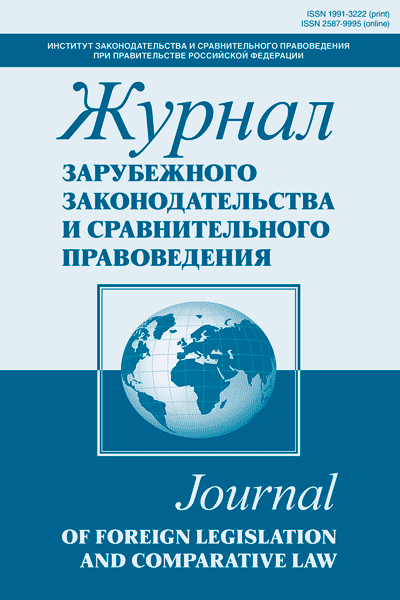Presented article addresses the question from the point of civil servants’. Using a survey among Baltic civil servants, the authors assess their views on three types of anti-corruption instruments (awareness, punishment, extraordinary investigations rights) and question if the recommendation will change according to where they perceive corruption to be most critical. The article contains a short theoretical discussion about individual incentives to accept bribes linking these to policy recommendations. The authors conclude that reforms and ethical training are needed to promote professionalism and meritocracy among the civil servants as an important factor for curbing corruption. Conducted study shows that despite of the fact that penalties for civil servants are recognized as important tool for counteracting corruption, it should be strictly followed principle of legal state based on maintenance of rule of law emphasizing that tradeoffs with respect to civil rights are inacceptable.
противодействие коррупции, государственные гражданские служащие, профилактика коррупции, страны Балтии, антикоррупционное просвещение.
1. Anechiarico, Frank, and James B. Jacobs. 1994. Visions of Corruption and the Evolution of American Public Administration. Public Administration Review, 54 (5): 465-473.
2. Arvey, R. D. and J. M. Ivancevich. 1980. Punishment in Organizations: A Review, Propositions, and Research Suggestions. The Academy of Management Review, 5 (1): 123-132.
3. Batory, Agnes. 2010. Post-accession malaise? EU conditionality, domestic politics and anti-corruption policy in Hungary. Global Crime, 11 (2): 164-177.
4. Dahlström, Carl, Victor Lapuente, and Jan Teorell. 2012. The Merit of Meritocratization: Politics, Bureaucracy, and the Institutional terrents of Corruption. Political Research Quarterly, 65 (3): 656-668
5. Evans, Peter, and James E. Rauch. 1999. Bureaucracy and Growth: A Cross-National Analysis of the Effects of “Weberian” State Structures on Economic Growth. American Sociological Review, 64 (5): 748-765.
6. Frisk, Mette (2013). The question of how Denmark got to be Denmark - a historical of fighting corruption, The Anticorruption research network - Transparency International: http://corruptionresearchnetwork.org/featured-articles/acrn-news/blog/the-question-of-howdenmark-got-to-be-denmark-2013-a-historical-pathway-of-fighting-corruptionFisman, R. & Svensson, J. 2007, Are corruption and taxationreally harmful to growth? Firm level evidence. Journal of Development Economics, vol. 83, no. 1.
7. Holmes, L. 2006. Rotten States? Corruption, Post-Communism & Neo-Liberalism. Durham: Duke University Press.
8. Johannsen, L. and K. H. Pedersen. 2011a. For the common good: Combatting corruption in new EU Member States. Journal of Comparative Politics, 4 (1): 91-110.
9. Johannsen, L. and K. H. Pedersen. 2011b. The Institutional Roots of Anti-Corruptions Policies: Comparing the Three Baltic States. Journal of Baltic Studies, 42 (3): 329-346.
10. Johannsen, Lars and Karin Hilmer Pedersen (2012). How to Combat Corruption: Assessing Anti-corruption Measures from a Civil Servants´ Perspective, Halduskultuur - Administrative Culture, vol 13, no. 2, pp. 130-146.
11. Karklins, Rasma (2002). Typology of Post-Communist Corruption, Problems of Post-Communism, July/August, pp. 22-32.
12. Klitgaard, Robert 1988. Controlling Corruption. Berkeley, CA: University of California Press.
13. Lambsdorff, J. G. (2007) The Institutional Economic of Corruption and Reform: Theory, Evidence and Policy. Cambridge: Cambridge University Press.
14. Liu, C. & Mikesell, J. L. 2014. The Impact of Public Officials? Corruption on the Size and Allocation of U. S. State Spending. Public administration review, vol. 74, no. 3, pp. 346-359.
15. Mccoy, J. L. and H. Heckel. 2001. The Emergence of a Global Anti-corruption Norm. International Politics, 38 (1): 65-90.
16. Nakrošis, Vitalis and Mantas Budraitis. 2012. Longitudial change in Lithuanian agencies: 1990-2010. International Journal of Public Administration, 35 (12): 820-831.
17. O´Dwyer, Conor. 2006. Runaway State-Building. Patronage, Politics and Democratic Development. Baltimore: Johns Hopkins. Ostrom, Elinor. 2000. Crowding out Citizenship. Scandinavian Political Studies, 23 (1): 3-16.
18. Rothstein, Bo and Jan Teorell. 2008. What is quality of government? A theory of impartial government institutions. Governance 21(2): 165-190.
19. Pedersen, K. H., Johannsen, L. 2007. The Talk of the Town: Comparing Corruption in the Baltic States and Poland16, in Schartau, M.-B., Berglund, S., Henningsen, B. (eds.), Political Culture: Values and Identities in the Baltic Sea Region, Berliner Wissenschafts-Verlag, Berlin, pp. 117-134.
20. Pedersen, K. H., Johannsen, L. 2006. Corruption: Commonality, Causes and Consequences in Fifteen Post-communist Countries18, in Rosenbaum, A., Nemec, J. (eds.), Democratic Governance in Central and Eastern European Countries, NISPAcee, Bratislava, pp. 311-336.
21. Rubin, Ellen V., and Andrew Whitford. 2008. Effects of the institutional design of the Civil Service: Evidence from Corruption. International Public management Journal, 11 (4): 404-425.
22. Sarapuu, Külli 2012. Administrative structures in times of changes: The development of Estonian ministries and government agencies 1990-2010. International Journal of Public Administration, 35 (12): 808-819.
23. Serritzlew, Søren, Kim Mannemar Sønderskov and Gert Tinggaard Svendsen (2012): Do Corruption and Social Trust Affect Economic Growth? A Review. Journal of Comparative Policy Analysis: Research and Practice, 16 (2): 121-139.
24. Treisman, Daniel 2000. The Causes of Corruption: a Cross-national Study. Journal of Public Economics, 76 (3): 399-457.
25. Treisman, Daniel 2007. What have we learned about the causes of corruption from ten years of cross-national empirical research? Annual Review of Political Science, 10(1): 211-244.
26. Weber, Max (1925 [1978]) Economy and Society, ed. by Guenther Roth and Claus Wittich, University of California Press, Berkeley and Los Angeles.





